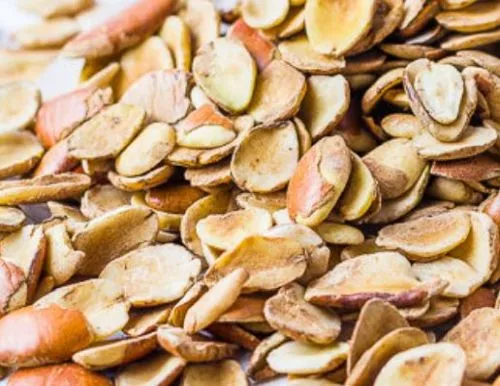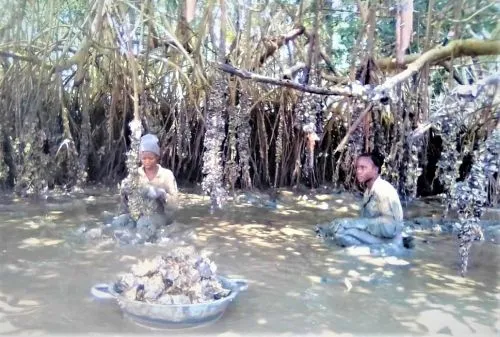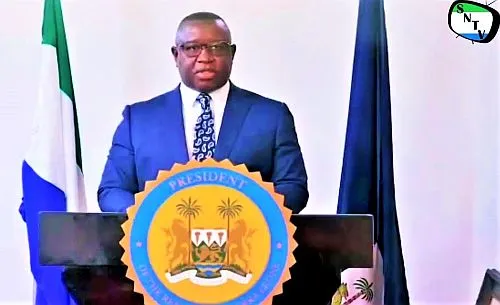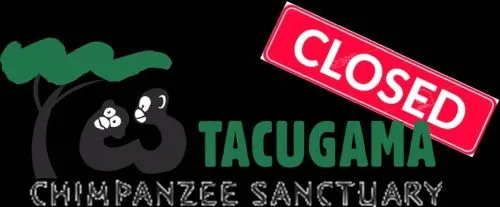Challenges beyond public health: the impacts of the COVID-19 outbreak on Sierra Leone's biodiversity
by Ambrose Bockarie Kanneh and Abdul Wahid Arimiyaw*
The recent increase in the number of COVID-19 cases across Africa poses an enormous challenge to the continent. The overwhelming negative impacts of the pandemic can be felt not only within the population, but also with regard to the continent’s economy and biodiversity. Naturally, most measures taken by the various national governments so far are primarily intended to cushion the impact on the human population. Nothing significant is being done to minimize the indirect threat posed by COVID-19 to protected areas and the conservation of biodiversity in Africa.
Biodiversity and ecosystem services are essential to humans: the case of Sierra Leone
In Sierra Leone, a country in West Africa, the COVID-19 outbreak has placed considerable anthropogenic (human-induced) pressures on its biodiversity. On March 24, 2020, Sierra Leone’s president Julius Maada Bio declared a 12-month period of national emergency, which was even before any COVID-19 cases had been confirmed in the country. On March 27, 2020 he announced the closure of the land borders to the neighboring countries Guinea and Liberia. Following the confirmation of two COVID-19 cases in the country, the government announced a three-day lockdown from April 5 to 7 (https://bit.ly/2Y1RCFJ). A further two-week partial lockdown, accompanied by strict measures aimed at preventing the spread of COVID-19 across the country, was declared by the president on April 11, 2020. As the number of confirmed cases increases, stricter measures were put in place to prevent the spread of COVID-19. On May 14, 2020 the country reported 408 positive cases, 26 fatalities and 97 people who had recovered from the disease (see https://mic.gov.sl/).
However, these restrictive policies implemented by the government seem to have a negative effect on the protection of natural habitats, biodiversity conservation, and, possibly, on conservation gains. For most nature conservation organizations, the implementation of lockdown measures poses a downside after several years of progress in protecting and conserving biodiversity. Moreover, many environmental organizations have cut back their operations, as well as their efforts to protect biodiversity and the environment, in an attempt to comply with the government's lock-down measures.
Sierra Leone's local communities
Sierra Leone is one of the countries that was affected by the Ebola virus disease in 2014. During this period, restrictive measures were equally put in place to reduce human-to-human transmission of the virus (https://bit.ly/2Lwenuj). The observation at that time was that communities adjacent to co-managed forests and protected forest areas were indiscriminately harvesting forest resources during the lockdown periods, thereby breaching existing conservation laws and guidelines. The exploited resources include non-timber forest products such as honey, mushrooms, fruits such as Irvingia gabonensis (ogbono), leaves, nuts, as well as medicinal plants like Xylopia aethiopica (also called grain of Selim, boiled to treat severe stomachache), Morinda citrifolia (used in combination with other plants to treat malaria), Garcinia kola (indigenously noted for the treatment of cough and asthma diseases) and other products which families consider vital. Thus, the natural habitats of several endangered wildlife species that had been protected for many years through conservation efforts, were destroyed (Barrie et al., 2015). The consequences of this human encroachment triggered by the crisis can be long-lasting for certain wildlife species. This particularly applies to species whose reproductive potential is low, and whose declining populations will take years to rebound, such as Chimpanzees and mature plant species.
Sierra Leone’s protected areas are at risk

The country, with its forests belonging to the Upper Guinean region, hosts one of 25 global biodiversity hotspots, has a total of 29 forest reserves, 13 of which have been designated as protected areas. Four of the 13 protected areas have been upgraded to National Parks in higher protection categories (National Biodiversity Strategy and Action Plan, NBSAP, 2017). The second (2017 – 2026) National Biodiversity Strategy and Action Plan of Sierra Leone (NBSAP, https://www.cbd.int/doc/world/sl/sl-nbsap-v2-en.pdf) stated that protected areas are established for the purpose of conserving and managing wild flora and fauna, as well as protecting sites, landscapes and geological formations. Unless authorized, the document (SL-NBSAP) strictly prohibits the hunting and capturing of wild animals and the harvesting of forest products, as well as activities such as agriculture, mining, and construction work in protected areas. National parks, for example the Gola Rainforest National Park in the south-eastern part of the country, and the Loma Mountain National Park in the north, serve as reservoirs for wildlife species and are known to have significant mineral deposits. Prior to the COVID-19 outbreak, patrol officers were deployed (also called ‘Eco-guards’), so miners, poachers, and loggers had very limited access to these sites for any illegal activities. With the current lockdown situation, as long as conservation agencies and organizations are unable to perform their monitoring and surveillance functions effectively, there is a risk that illegal activities and biodiversity degradation will continue in Sierra Leone.

Eco-guards should be equipped and permitted to do their job
In critical times like these, when forest guards are not in a position to patrol efficiently due to national mobility constraints, miners and poachers are most probably going to take undue advantage of the situation as they did during the Ebola outbreak (https://bit.ly/2Lwenuj). So national parks such as the Gola Rainforest National Park, with a history of persistent mining and poaching activities over the years (Barrie et al., 2015) may be highly vulnerable to poaching and illegal mining activities during the lockdown period. The scale of the destruction to be brought on by the current lockdown can only be imagined. In a personal informal interview with one eco-guard/ranger working for the National Protected Area Authority (NPAA) of Sierra Leone, we found out that he was at home during the lockdown. In our opinion, following the global trend of increasing poaching during this pandemic (https://bit.ly/2TbP6cL), and the suggestions made by Linkie et al. (2003) concerning the need for more regular patrols to protect endangered species, forest guards should be seen as an integral part of the law enforcement authorities. Much like other government employees and law enforcement personnel (police officers, military and health care workers), who are allowed to work, they should be permitted to operate to secure national parks and biodiversity during lockdowns.

The aquatic environment is not spared
The aquatic environment has also been exploited by poor coastal communities in a bid to stock up on protein sources during this lockdown period. Aquatic species were harvested uncontrollably, regardless of the type and size of fish to be captured, resulting in numerous by-catch issues. Coastal communities situated along the Sherbro River Estuary of the Bargura Creek; Moyamba District - southern Sierra Leone were mostly affected. Fishing has always been the main source of livelihood for these communities, but due to the COVID-19 pandemic, many more people are fishing in these waters, putting aquatic species at higher risk of exploitation (see https://bit.ly/2yztIH7).
Animals in captivity – what is their fate?
The conservation of biodiversity is not limited to flora and fauna in the wild, but also includes wild species in captivity. Most zoos and sanctuaries are closed to tourists during the lockdown and all revenue-generating operations have been suspended. On March 28, the Tacugama Chimpanzee Sanctuary, the only animal sanctuary in Sierra Leone, closed its doors to the public and thereby cut off its primary source of income.
The sanctuary has engaged in fundraising events on its social media platforms, and is now accepting donations to raise funds for the care of chimpanzees and to pay for some of the routine costs for running the sanctuary (https://bit.ly/2x2XSCa). This is true for many other animal welfare organizations and institutions in this challenging time. All of this demonstrates the pressures and difficulties that the COVID-19 outbreak poses on biodiversity.
Post-lockdown issues: Food security - a long-term risk?
As a result of this pandemic, there is currently no productive output in the agricultural and informal sector. This situation entails a lack of revenues for most rural households. Another important area of concern at the end of the COVID-19 pandemic is the quest for forest products and resources, as farmers, for example, were unable to cultivate their farms during the lockdown. These peasants are partly feeding and living on farm produces that were cultivated, harvested, and stored prior to the outbreak of COVID-19. When the mobility ban is lifted, they are expected to resume regular activities, at which point much of their food supplies will have been exhausted. This “transition” back to normal life may then lead to renewed dependence on the forests and their products.
What is the future outlook for biodiversity?
The government is committed to ensure the protection of its biodiversity and ecosystems. On November 20, 2019, Sierra Leone officially joined the UN Intergovernmental Science-Policy Interface on Biodiversity & Ecosystem Services (IPBES, https://www.ipbes.net) as its 133rd member state. The goal is to effectively contribute to IPBES, whilst at the same time, working to narrow the in-country gap between science and policy on Biodiversity and Ecosystem Services. It will therefore be prudent to take into consideration the COVID-19-induced challenges and take appropriate measures to tackle them in the broader context of biodiversity conservation. In the meantime, the government will do good to immediately reinstate surveillance and monitoring personnel in protected areas in order to curb the excessive and indiscriminate exploitation of the resources of protected areas by unlawful intruders. As the government continues to raise awareness of COVID-19 and to educate the public about the hygiene measures to be observed during this time, it is our expectation that biodiversity is not side-lined.
*The authors are graduate students of the WABES MSc. Program.
‘WABES’ is a ZEF-led research and capacity building program funded by the International Climate Initiative (IKI) of the German Federal Ministry for the Environment, Nature Conservation, and Nuclear Safety (BMU).
‘WABES supports West African contributions to IPBES.
Website: http://www.wabes.net
References cited
Barrie, A., Zwuen, S., Kota, A. N., Luo, M., & Luke, R. (2007). Rapid survey of large mammals of North Lorma, Gola and Grebo National Forests. In A Rapid Biological Assessment of North Lorma, Gola and Grebo National Forests, Liberia. Conservation International.
Linkie, M., Martyr, D. J., Holden, J., Yanuar, A., Hartana, A. T., Sugardjito, J., & Leader-Williams, N. (2003). Habitat destruction and poaching threaten the Sumatran tiger in Kerinci Seblat National Park, Sumatra. Oryx, 37(1), 41-48.



